| |
| Dokuga often seems cold on the outside but is
very warm on the inside. He usually wears an emotionless
expression, sometimes with hints of weariness or sadness, but he
has good reasons for being the way he is. |
|
 |
His poison saliva has far-reaching
consequences in his personal life, and probably shapes his
identity more than anything else. It doesn't discriminate
between friend and foe, making him a walking biohazard. It
isolates him even among his comrades: he eats alone, bathes
alone, sleeps alone, and has his own special utensils. If he has
to engage in a communal activity that exposes others to risk of
his poison, he does the activity last (and alone).
This is more than simple inconvenience. It's a fundamental sense
of separation that pervades his entire experience of the world. He says
he's "just living life in a way that doesn't cause trouble for
everyone," but what he really means is that he is
trouble. He is poisonous. Just by existing, he
is a danger to everyone around him.
And this doesn't only affect purely superficial routines, but
his outward emotional expression. He has to reign in the natural
physical impulses that come with anger and joy. As Natsuki
pointed out, he can't even kiss or be intimate with someone,
which severely restricts his freedom in interpersonal
relationships.
This results in a false external calm when, in fact, his
internal emotional world has not dulled one bit. Instead of
making him more neutral, it could be said that the physical
repression actually amplifies his feelings. So overwhelming are
they that, when convinced to outwardly share them, he literally
doubles over and has to support himself against walls. |
|
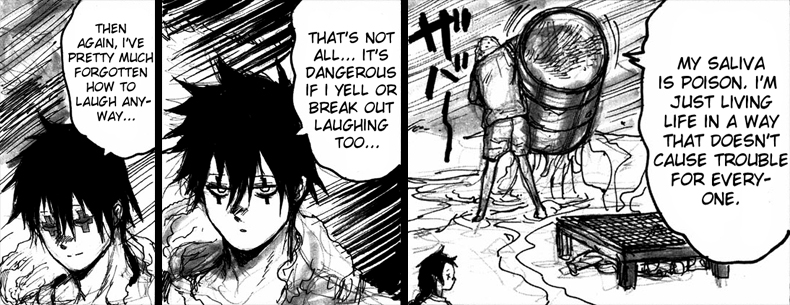 |
| The sense of isolation is compounded by the
fact that the whole sorcerer world treats him, and others like
him, as an outsider. Because he can't emit magical smoke,
society has drilled into him since childhood that he's nothing,
that he's nobody, that he's trash. So abysmal was his
self-esteem as a kid that he welcomed rain-induced agony as
justifying his existence. |
|
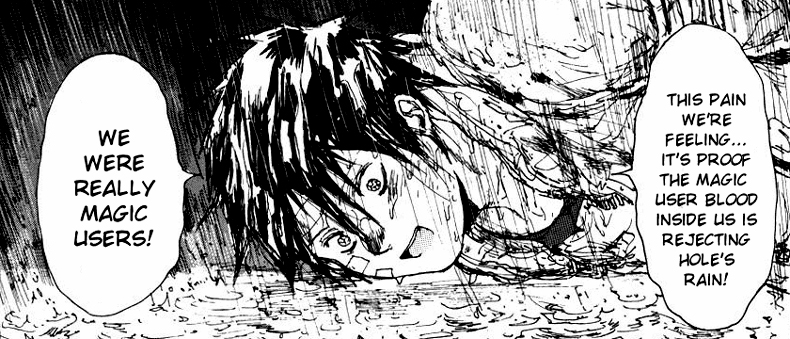 |
.
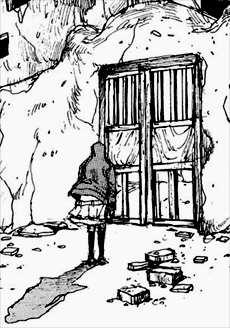
|
Maybe his childhood could go towards explaining his
genuine humility.
He really has no pride to speak of, and downplays
compliments offered him by Natsuki. Whether it was a
matter of politeness, a realistic assessment of his
abilities, or his own opinion of himself, it says
something about his character.
Another interesting indicator was the cross-dressing
episode. There was no flaunting, no complaining; didn't
even tell anyone. He just surmised that he could pass
for a hot girl and did what had to be done to save his
friends. |
|
.
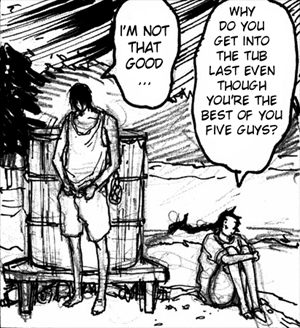 |
|
| Here the CrossEyes Officers are investigating
where Natsuki suddenly disappeared to. Dokuga leans in, and
then... wait for it... |
|
 |
| Naked Natsuki pops out. Dokuga does a
panicked blush. The next panel he's gone, replaced by Tetsujo,
while Ton is unfazed. |
|
 |
.
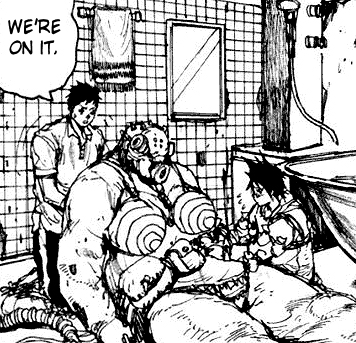 |
It's important to note that he wasn't blushing because
he saw an arguably attractive young girl naked. Dokuga
is just an acutely self-conscious person and was
blushing from the awkwardness of the situation.
He was blushing even harder all through the scene of
having to undress the dead and relatively unattractive
landlady. Even before the bra came off, he was blushing
and sweat-dropping at the thought alone. |
|
.
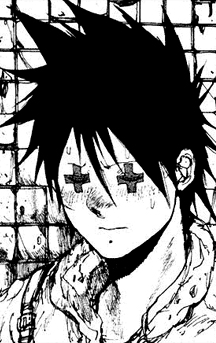 |
|
| Perhaps this intense awareness of his
surroundings is also what makes Dokuga so considerate of others. |
|
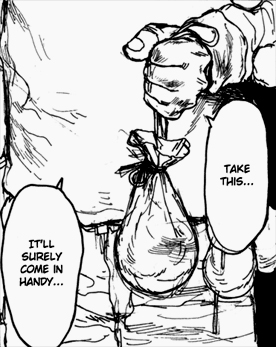 |
He not only packs Kai's lunch, but
has the foresight to put together an emergency survival
pouch that ends up saving his life.
And speaking of pouches, the bags he wears tied to
himself look an awful lot like black powder pouches. This
gave me the
mental image of Dokuga as some black powder pixie that
runs up to sprinkle some on Kai if he runs out of smoke.
Of course, we now know he keeps
all sorts of fun things in there!
After Kai turned into a monster with the mind of an
autistic child, Dokuga revealed his maternal instinct
and skill as a babysitter. |
|
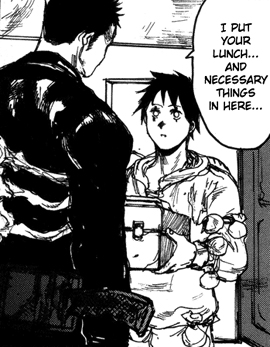
. |
|

. |
I'd like to point out that Dokuga is not sexist.
When his beloved Boss is transformed into a pie
and Kirion kicks the pie out a window, Dokuga is
furious. Yet, despite this, he remains polite enough to
not bring gender into it.
Though what he calls her can accurately be translated as
"you bitch," what he actually says is "kisama."
It is a derogatory word, but nevertheless
gender-neutral.
This is in contrast with other characters (notably
Fujita and Chota) who I have seen use the gender
specific derogatory "kono
ama" (notably towards Nikaido).
These little things matter to me...
|
|
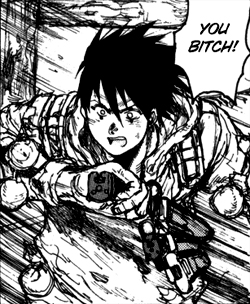 |
|
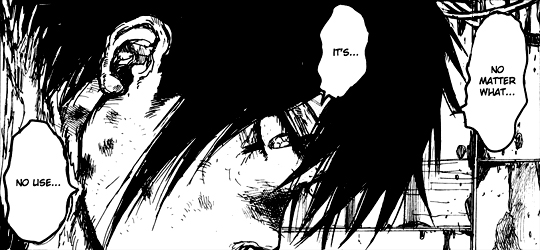 |
| Dokuga is also highly
resistant to interrogation and torture. Aside from his
obvious loyalty to his Boss, his childhood likely
acclimated him to abuse. He'll writhe and scream, and
show every sign of fear but he'll never talk, even if
you feed him alive to flesh-eating worms. When Chota
kept calling him "trash," a word used to oppress him all
his life, Dokuga did not fight it, for he has little use for
pride or self-preservation. |
|
|
.
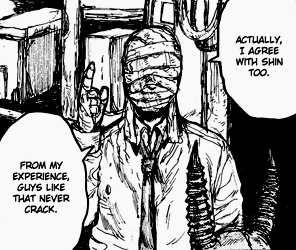
. |
| Both Shin and Shou
recognized this quality in Dokuga, which I see as a sign
of their respect for him (mixed with annoyance). And
truly, Dokuga had never been in such a blatantly hostile
situation before. Sure he's had a very rough life, but
he always had his friends by his side. Now he was
utterly helpless and alone in a den of elite magic
users, deprived of all hope because he knew his Boss
couldn't back him. And, despite his growing doubts about
Kai's motives, Dokuga still didn't talk to the enemy. |
|
.
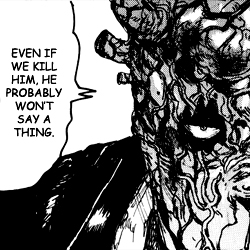
. |
|
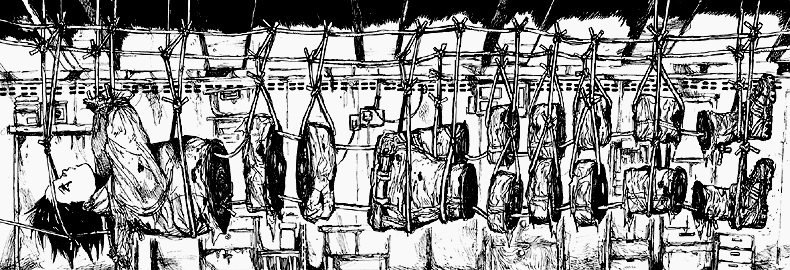 |
|
|
|
|
















